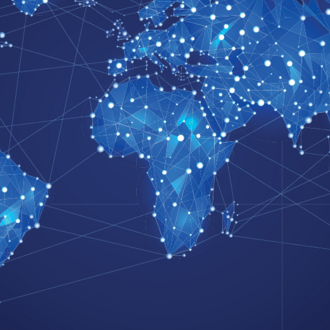Alumni
Alumni Spotlight: Adetayo Bamiduro, MBA ’15, and Chinedu Azodoh, MFin ’15
By
Adetayo Bamiduro, MBA ’15, and Chinedu Azodoh, MFin ’15, always wanted to build a better world in their native Nigeria. So, when the two MIT Sloan alumni returned home after graduation, they immediately set about accomplishing their goal.
They cofounded Metro Africa Xpress, a motorbike ride-hailing and delivery service popularly known as MAX.ng. The smartphone and web-based platform is much like Uber, Lyft, and other ride-sharing companies. Though as Bamiduro and Azodoh explain, their primary goal is creating an affordable, accessible, and more secure mobility infrastructure for the African continent.
What drives or inspires you?
Adetayo: I’m from a middle-class family. My dad worked as a university professor and my mom worked as a journalist and an entrepreneur. When Nigeria achieved independence in the early 1960s, their generation was very excited about figuring out how to build an independent country. Civil servants, government workers, and academics like them contributed everything to this country, but it was frustrating and disappointing. That shaped me significantly. I have always felt a huge responsibility to help my generation do better. I’m trying to change the country’s story and turn it around for the next generation. I have two daughters and I'm working to ensure that when they grow up, they can look back and be proud of what we accomplished. There is an incredible amount of work that needs to get done, but it keeps me going.
Chinedu: The key thing is to build businesses that have a transformative impact on people. At MAX.ng, we think about financial results and social impact. Better opportunities drive people to get to the next level. If you have access to capital or know operational processes, you can build financially successful systems that will have those kinds of impacts. Most cycle taxi drivers made about $80 a month when we started MAX.ng. Within two and a half years, every driver on our platform was making $600 a month. We also give them insurance and offer other programs to help increase their potential. We want to put them on a better path. That’s what we’re doing in Nigeria—developing social systems and social infrastructure.
How has your time at MIT Sloan influenced your ideas?
Adetayo: MIT Sloan helped me realize I could contribute significantly to the world through leadership. Leadership is something we desperately need in less developed countries, where the idea is often inaccurate or polluted. Those who have endured decades of military or autocratic role think leadership means being the boss and having absolute authority. It’s viewed as having the political authority to do whatever you want. At MIT Sloan, leadership is so much more. Leaders should drive positive change and inspire others to go on a journey with them.
Chinedu: Before MIT Sloan, I had never worked that hard in my life. I understood long hours from my time building technology for investment banking, but it’s like that saying about drinking from a firehouse. You’re always on and you’re always in the middle of everything. At the same time, you learn about management and how to better prioritize things. This is the biggest challenge for people who start companies. They’re used to being so close to everything that, as the company grows, they struggle because they try to do everything. MIT Sloan taught us how to solve this problem. You have to find the right kind of people to work with and let them work.
What is the biggest idea you are working on right now?
Chinedu: Think about COVID-19. In America, people are getting paid by the government, but the Nigerian government has lifted the lockdown in most cities because they don’t have the cash for that. It’s effectively every man for himself. It’s also up to businesses like MAX.ng. We have to figure out how to transition from being a contact-heavy business to a contactless one. Delivery is one form of this, obviously, but we're already well beyond that.
Adetayo: A lot of our work involves building technology for better distribution and mobility in African cities and urban communities. With the pandemic, now is the time for us to apply this technology to other industries. We’re taking a more aggressive approach and using our technology to solve problems with food security and supply chains throughout Nigeria and the continent. We’re bringing efficiency to the movement of produce, crops, and other raw materials. We’re solving some of the market inefficiencies that have existed for so many decades. As a result, we’ve helped increase incomes for small farmers. It’s exciting for us to see this happening now, because it means we’re that much closer to accomplishing our number one mission—building a more robust Nigerian and African economy.



